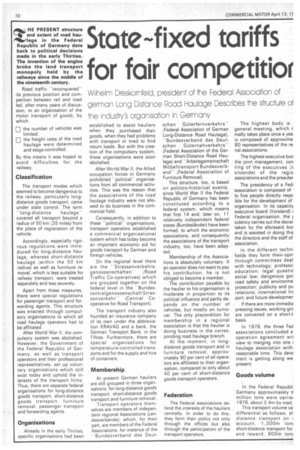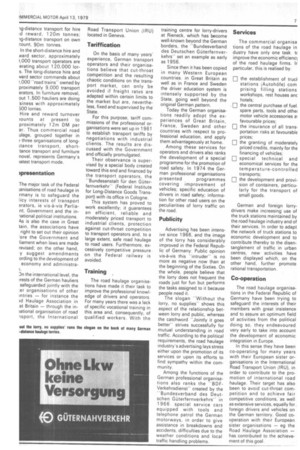State fixed tariffs for fair competitior
Page 72

Page 73

If you've noticed an error in this article please click here to report it so we can fix it.
Wilhelm Dreskornfeld, president of ne Federal Association of german Long Distance Road Haulage Describes ne structure of he industry's organisation in Germany
0 the number of vehicles was limited;
D the freight rates of the road haulage were determined and stage-controlled.
By this means it was hoped to avoid difficulties for the railway.
Classification
The transport modes which seemed to become dangerous to the railway, particularly longdistance goods transport, came under state control. The term "long-distance haulage" covered all transport beyond a radius of 50 km (35 miles) from the place of registration of the vehicle.
Accordingly, especially rigorous regulations were introduced for long-distance haulage, whereas short-distance haulage (within the 50 km radius) as well as furniture removal, which is less suitable for railway transport, were treated separately and less severely.
Apart from these measures, there were special regulations for passenger transport and forwarding agents, This structure was enacted through compulsory organisations to which all road haulage operators had to be affiliated.
After World War II, the compulsory system was abolished. However, the Government of the Federal Republic of Germany, as well as transport operators and their professional representatives, set up voluntary organisations which still exist today and uphold the interests of the transport firms. Thus, there are separate federal organisations for long-distance goods transport, short-distance goods transport, furniture removal, passenger transport and forwarding agents.
Organisations
Already in the early Thirties, specific organisations had been established to assist hauliers when they purchased their goods, when they had problems with transport or tried to find return loads. But with the creation of the compulsory system, these organisations were soon abolished.
After VVcrld War II, the Allied occupation forces in Germany prohibited -political" organisations from all commercial activities. This was the reason that the associations of the road haulage industry were not allowed to do business in the commercial field.
Consequently, in addition to these "political" organisations, transport operators established a commercial organisational system which has today become an important economic aid for goods transport by German and foreign vehicles.
On the regional level there are the "Strassenverkehrsgenossenschaften" ,Road Traffic Co-operatives) which are grouped together on the federal level in the "Bundeszentralgenossenschaft Strassenverkehr" (Central Cooperative for Road Transport).
The transport industry also founded an insurance company of its own under the abbreviation KRAVAG and a bank, the German Transport Bank, in the Fifties. Furthermore, there are special organisations for temperature-controlled transports and for the supply and hire of containers.
Membership
At present German hauliers are still grouped in three organisations for long-distance goods transport, short-distance goods transport and furniture removal.
Transport operators themselves are members of independent regional Associations i,Landesverbande), which, for their part, are members of the Federal Associations, for instance of the "Bundesverband des Deut
schen Gi3terfernverkehrs(Federal Association of German Long-Distance Road Haulage), "Bundesverband des Deutschen Guternahverkehrs" (Federal Association of the German Short-Distance Road Haulage) and "Arbeitsgerneinschaft Mobeltransport Bundesverband" ,Federal Association of Furniture Removal).
This structure, too, is based on politico-historical events. since World War II the Federal Republic of Germany has been constituted according to a federal system, which means that first 14 and, later on, 11 relatively independent federal states (Bundeslander) have been formed, to which the economic associations, and consequently the associations of the transport industry, too, have been adapted.
Membership of the Associations is absolutely voluntary. If an operator does not want to pay his contribution, he is not obliged to become a member.
The contribution payable by the haulier to his organisation is moderate in proportion to its political influence and partly depends on the number of vehicles, but mostly on turnover. The only precondition for membership in a regional association is that the haulier is doing business in the corresponding road haulage branch.
At the. moment, in longdistance goods transport and in furniture removal, approximately 90 per cent of all operators are affiliated to their organisation, compared to only about 40 per cent of short-distance goods transport operators.
Federation
The Federal associations defend the interests of the hauliers centrally. In order to do this, they form their policy not only through the offices but also through the participation of the transport operators.
The highest body is general meeting, which r mally takes place once a yea is composed of approxima 80 representatives of the re, nal associations.
The highest executive boc the joint management, con ting of the executives (\d sitzende) of the regio associations and the presider
The presidency of a Fedi association is composed of to five people directly respc ible for the development of organisation. In its capacity executive board (Vorstand) Federal organisation, the sidency carries out the decisi taken by the aforesaid boc and is assisted in doing this the directors and the staff of association.
In the different techni fields they form their opir through committees deal with technology; professic education; legal questio social law; dangerous goc road safety and environme protection; publicity and pu relations; international trE port; and future developmer If there are more immedia pressing issues, working grc are convened on a short-t basis.
In 1978, the three Fed associations concluded a operation agreement wit view to merging into one haulage association with reasonable time. This devE ment is getting along we present.
Goods volume
In the Federal Republi Germany approximately tl million tons were carriei 1978, about 2.4m by road.
This transport volume ca differential as follows distance transport on account, 1,300m toni short-distance transport for and reward, 900m tom 1g-distance transport for hire id reward, 120m tonnes; 1g-distance transport on own r:ount, 90rn tonnes.
In the short-distance hire and Nerd sector, approximately 1,000 transport operators are erating about 120,000 lors. The long-distance hire and yard sector commands about 1,000 "road trains" owned by proximately 9,000 transport erators. In furniture removal, out 1,500 hauliers are doing siness with approximately 500 lorries.
Hire and reward turnover iounts at present to proximately 12m DM per ar. Thus commercial road ulage, grouped together in three organisations of long;tance transport, shorttance transport and furniture noval, represents Germany's !atest transport mode.
:presentation
The major task of the Federal ranisations of road haulage in rmany is to safeguard the licy interests of transport orators, ie vis-à-vis Parliant, Government and the in political institutions. As is also the case in Great tam, the associations have right to set out their opinion 'ore the Government and liament when laws are made revised; on the other hand, y suggest amendments ording to the development of economy and administra Dnthe international level, the ;rests of the German hauliers safeguarded jointly with the er organisations of other intries — for instance the id Haulage Association in at Britain — through the iniational organisation of road 1sport. the International Road Transport Union (IRU) located in Geneva.
Tariff ication
On the basis of many years' experience, German transport operators and their organisations believe that cut-throat competition and the resulting chaotic conditions on the transport market, can only be avoided if freight rates are adapted within certain limits to the market but are, nevertheless, fixed and supervised by the State.
For this purpose, tariff commissions of the professional organisations were set up in 1961 to establish transport tariffs by negotiations with industrial clients. The results are discussed with the Government and officially promulgated.
Their observance is supervised by a special body created toward this end and financed by the transport operators, the "Bundesanstalt fur den Cuterfernverkehr" (Federal Institute for Long-Distance Goods Transport) with its office in Cologne.
This system has proved to work excellently; it guarantees an efficient, reliable and moderately priced transport to industrial clients, protection against cut-throat competition to transport operators and, to a large extent, safe road haulage to road users. Furthermore, excessively competitive pressure on the Federal railway is avoided.
Training
The road haulage organisations have made it their task to improve the professional knowledge of drivers and operators. For many years there was a lack of specific vocational training in this area and, consequently, of qualified workers. With the training centre for lorry-drivers at Rieneck, which has become well-known beyond the German borders, the "Bundesverband des Deutschen GOterfernverkehrs" set an example as early as 1956.
Since then it has been copied in many Western European countries. in Great Britain as well as in France and Sweden the driver education system is intensely supported by the State, going well beyond the original German pattern.
Today the German organisations readily adopt the experiences of Great Britain, France, Sweden and other countries with respect to professional education, and apply them advantageously at home.
Among these services for operators and drivers also ranks the development of a special programme for the promotion of road safety. In 1974 the German professional organisations presented programmes covering improvement of vehicles; specific education of drivers in road safety; information for other road users on the peculiarities of lorry traffic on the road.
Publicity
Advertising has been intensive since 1966, and the image of the lorry has considerably improved in the Federal Republic of Germany Public opinion vis-à-vis this ''intruder" is no more as negative now than at the beginning of the Sixties. On the whole, people believe that the lorry does not frequent the roads just for fun but performs the tasks assigned to it because people need it.
The slogan "Without the lorry, no supplies" shows this aspect of the relationship between lorry and public, whereas the catchword "Jointly it goes better" strives successfully for mutual understanding in road traffic. According to the political requirements, the road haulage industry's advertising lays stress either upon the promotion of its services or upon its efforts to find sympathy within the community.
Among the functions of the German professional organisations also ranks the "BDFVerkehrsdienst" created by the –Bundesverband des Deutschen Guterfernverkehrs" in 1966 special service cars equipped with tools and telephone patrol the German motorways, in order to give assistance in breakdowns and accidents, difficulties due to the weather conditions and local traffic handling problems. Services
The commercial organisa tions of the road haulage in dustry have only one task tc improve the economic efficienc) of the road haulage firms. Ir particular, this is realised by.
fl the establishment of trucl stations (Autohofe) corn prising filling stations workshops, rest houses anc hotels; LI the central purchase of fuel spare parts, tools and othei motor vehicle accessories al favourable prices;
0 the insurance of all transportation risks at favourablE prices; O the granting of moderately priced credits, mainly for the financing of vehicles;
LI special technical and economical services for the temperature-controlled transports;
O the development and provision of containers, particularly for the transport of small goods.
German and foreign lorrydrivers make increasing use of the truck stations maintained by the road haulage industry and of their services. In order to adapt the network of truck stations to economic development and to contribute thereby to the disentanglement of traffic in urban centres, new activities have been displayed which, on the other hand, further promote rational transportation.
Co-operation
The road haulage organisations in the Federal Republic of Germany have been trying to safeguard the interests of their members with great insistence and to assure an optimum field of activities from the political doing so, they endeavoured very early to take into account the development of economic integration in Europe.
In this sense they have been co-operating for many years with their European sister organisations in the International Road Transport Union (IRU), in order to contribute to the promotion of international road haulage. Their target has also been to avoid cut-throat competition and to achieve fair competitive conditions, as well as extensive services, equally for foreign drivers and vehicles on the German territory. Good cooperation with their European sister organisations — eg the Road Haulage Association — has contributed to the achievement of this goal.
















































































































